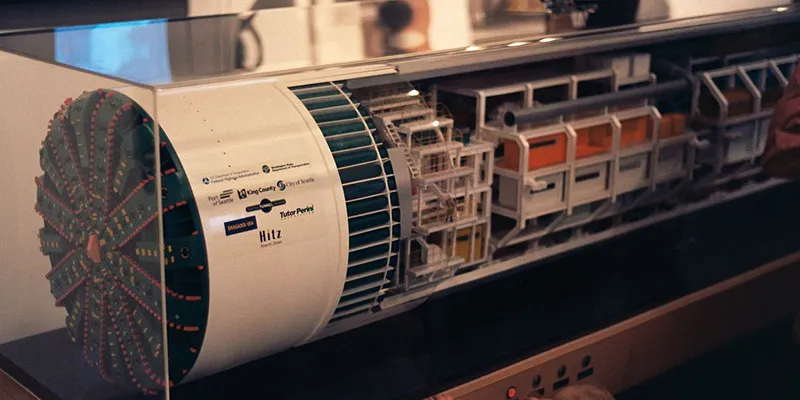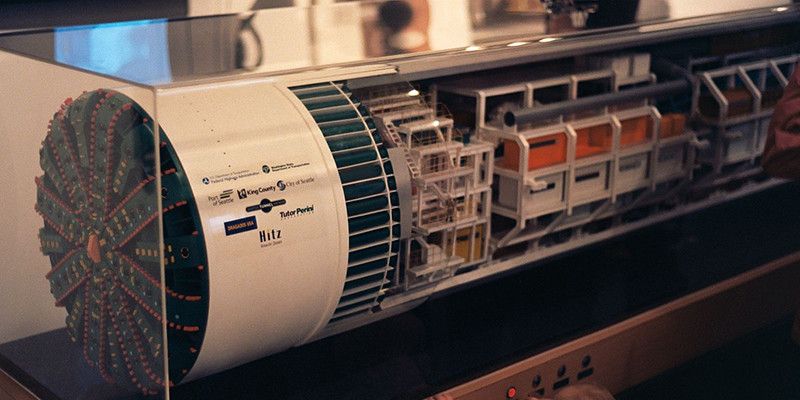Elon Musk and his ‘boring’ plan to solve traffic woes by digging tunnels
Elon Musk, it seems, has taken it upon himself to create the hi-tech reality the futurists of yesteryear had predicted. From revolutionising the automotive industry with Tesla to paving the way for new-age space travel with SpaceX, Musk is undoubtedly the most radical innovator of this century (so far). One of his latest projects, and he has so many, attempts to solve a steadily-worsening problem that has existed for decades: traffic. And he isn't alone in this regard; several companies and cities are trying to combat traffic by introducing innovative alternatives to road-based transport. But while most them are looking to the skies for the solution, Musk has decided the answer lies underground.

Image credits: www.creativecommons.com
It began with a tweet. In December last year, stuck in a traffic jam in Los Angeles, Musk tweeted “Traffic is driving me nuts. Am going to build a tunnel boring machine and just start digging.” Within an hour, he had a name for the project — “It shall be called ‘The Boring Company’,” he wrote. A few hours later Musk tweeted again: “I am actually going to do this.” But no one knew whether they should take Musk, who is known for posting amusing statements on Twitter, seriously. It turns out that he was serious (about most of it anyway — ‘The Boring Company’ was apparently a joke and he has come up with a slew of alternate names since) and his ‘boring’ plans are well under way.
Workers recently dug a ‘test trench’ that is 15-feet-deep, 50-feet-long, and 30-feet-wide in the parking lot of SpaceX's office premises in Los Angeles. The project, led by SpaceX rocket engineer Steve Davis, is purely experimental — a fact that Musk has reiterated multiple times. “We’re just going to figure out what it takes to improve tunnelling speed by, I think, somewhere between 500 and 1,000 percent,” he said at a Hyperloop design competition at SpaceX in January. “We have no idea what we’re doing—I want to be clear about that.”
But there is some method to Musk's madness. His grandiose vision for the future of intra-planetary transportation comprises of a three-dimensional network of tunnels that would cater to cars and high-speed railways. “If you think of tunnels going 10, 20, 30 layers deep (or more), it is obvious that going 3D down will encompass the needs of any city’s transport of arbitrary size,” Musk told WIRED magazine.
Of course, a project of this magnitude isn’t possible without facing several challenges, especially when there’s no clear business model supporting it. Musk didn’t need the permission of the city’s planning commission to dig a pit in his company’s backyard, but he will certainly need it if his plans to extend it to the Los Angeles’ airport are to become a reality. But if anyone can accomplish this improbable task, it’s Elon Musk. A key member of the US President’s Economic Advisory Council, Musk is in the prime position to make the most of Trump’s proposed $1 trillion infrastructure development plan. And while the two don’t see eye-to-eye on several topics (climate change and the immigration ban among them), the one thing Trump can't deny is that Musk's project will create a lot of jobs — a trillion jobs by Musk's estimation.
One might wonder why Musk, a man with plans to colonise Mars, is going underground for solving Earth’s transportation crisis when the rest of the world is aiming for the skies. The answer is simple: Musk believes that flying cars are a bad idea. “Obviously, I like flying things,” he told Bloomberg's Max Chafkin. “But it’s difficult to imagine the flying car becoming a scalable solution.” The wind and noise that accompany the downforce generated by flying vehicles along with the possibility of hazardous debris falling from the skies in the case of mid-air collisions are the reasons Musk states in defence of staying away from flying cars. Tunnels, he reasons, are the only way to go about solving this particular problem.
And who knows, if it does prove to be successful on Earth, maybe it'll work out on Mars as well when Musk begins his long-awaited colonisation of the ‘Red Planet’.







